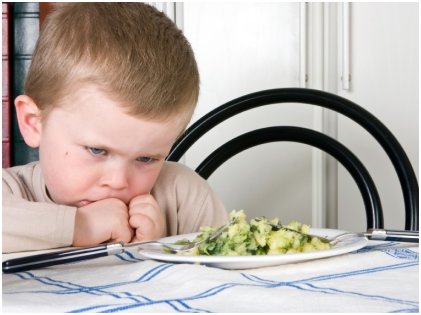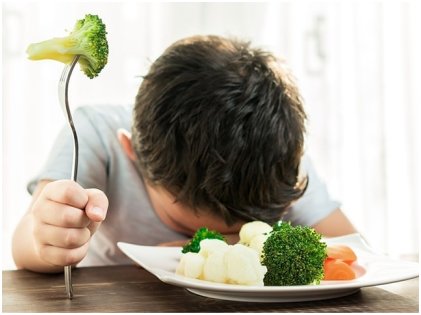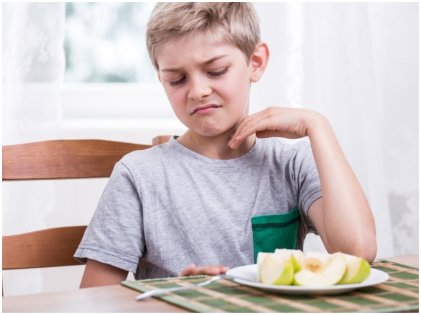
Five Things NOT To Say To Your Kids At The Dinner Table

Kids and eating are two words that don’t co-exist in peace. Most parents complain about their kids’ eating habits. Either their kids throw tantrums while eating food or they are more addicted to junk. Parents do have a part to play in the habits they instill in their kids when they are still young. But you can’t really blame them when their kids choose to eat french fries over broccoli. Taste does matter, and kids are not mature enough to understand the benefits of eating healthy food. Hence, parents get too anxious when their children do not want to eat vegetables and fruits. They tend to use various tips and tricks to make them eat, and a lot of patience is required in this regard. However, it has been found that there certain things that should not be said to them when you are at the dinner table.
“Eat Your Veggies And You Will Get Dessert”

This is a ploy that all parents are guilty of using whenever they want their kids to eat. But if we say this to our children, we are unconsciously telling them that veggies are not tasty at all and dessert is something very special. By doing this, we are promoting dessert to a special position and doing the opposite for veggies. Do not offer food as a form of punishment or reward. Serve dessert for everyone, but if your children are not eager to have nutritious veggies and only want and demand dessert, limit their dessert intake.
“Don’t Fuss”

Kids are naturally fussy; this kind of behavior is nothing new. But if you constantly rub it on their face, they will stop trying new things because they think that being fussy equates to unsavory things. So quit saying things like, ” You are so fussy” and similar lines while having dinner together. Instead, keep encouraging them to try new food or tell them the story behind how fruits and vegetables grow. Knowing about food, where they come from, and developing an appreciation for it while we eat makes our eating experience even better.
“Eat Some More”

Pushing your kids to have more food will result in them refusing to listen to their bodies at all. Hence, we see many kids today who do not ever say they are hungry or their stomach is full! Let your child be hungry and let them decide when they are full. Instill these habits in them when they are still young, and it will teach them to manage their own hunger pangs and also listen to their body for signals when they are full.
“Try This Food, It Will Be Good For You”

Children can be very picky when it comes to eating. Research shows that kids usually reject the same food 10 to 12 times before giving it a try. Hence, parents need to be persistent. But make sure you find out new ways to make them eat a certain vegetable or meal. If you keep saying that they need to try something as it is good for their health, they are likely not to listen. Also, force-feeding them despite their protests can backfire and your child might not say yes to new food ever again, knowing it will create tension at the dinner table. Instead, present it in a new way, mix it up with other food, serve it to their friends, siblings, or cousins at the same table, and let them see that others do enjoy eating it.
“It Is Good That You Finished All Your Food”

While this might seem like a harmless thing to say, it typically means something else that you probably didn’t mean at all. But your little one might catch it! Getting to hear good words from parents is something all kids love. When they hear their parents saying they did a great job by finishing all their food on the plate, they will keep trying to impress them by doing it every day. Finishing all the food on the plate will become more important than even the quality of the food or their own appetite. Moreover, they might end up overeating just for the sake of cleaning their plate and end up making themselves sick.
Hence, be careful what you say to your little ones for they are smarter than they look and can definitely make out hidden meanings from what you are telling them. Eating when hungry and eating healthy are the two most important things they should learn right from their childhood. Be sure that you’re there to guide them every step of the way.
More in Family Counseling
-
`
5 Reasons Why Dad’s Side of the Family Misses Out
Family bonds are intricate and multifaceted, often creating a unique tapestry of connections. However, many people notice a peculiar trend: stronger...
July 12, 2024 -
`
A Quick Guide on How to Get Short-Term Disability Approved for Anxiety and Depression
Living with anxiety or depression poses unique challenges, particularly in the workplace, where stress can exacerbate symptoms. For many, short-term disability...
July 5, 2024 -
`
Why Do People Feel Sleepy After Eating?
Is feeling sleepy after eating a sign of diabetes? Well, not directly. There are many reasons why you feel drowsy after...
June 20, 2024 -
`
What Is High-Functioning Depression? Symptoms and Treatment
High-functioning depression may not be a term you hear every day, but it’s a very real and challenging experience for many....
June 13, 2024 -
`
Kelly Clarkson’s Weight Loss Ozempic Journey – Debunking the Rumors
In a refreshing moment of transparency, Kelly Clarkson, the beloved singer and talk show host, sheds light on her remarkable weight...
June 3, 2024 -
`
What Is the Best Milk for Gut Health and Why?
In recent years, the milk section at the grocery store has expanded far beyond the traditional options. While cow’s milk has...
May 30, 2024 -
`
Do Dental Implants Hurt? Here’s All You Need to Know
When you hear “dental implants,” you might wince at the thought of pain. But do dental implants hurt as much as...
May 24, 2024 -
`
5 Key Differences Between A Psych Ward & A Mental Hospital
Curious about the differences between a psych ward and a mental hospital? You are not alone. With the mental health conversation...
May 16, 2024 -
`
It’s Official! “Selling Sunset’s” Christine Quinn & Husband Christian Dumontet Are Parting Ways
Have you ever found yourself unexpectedly engrossed in the personal lives of celebrities, especially when their stories take dramatic turns? Well,...
May 9, 2024










You must be logged in to post a comment Login